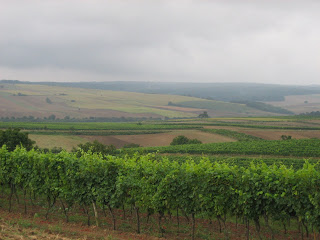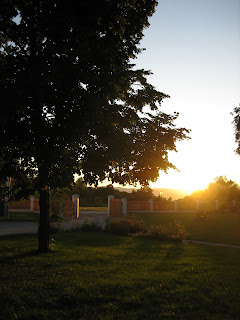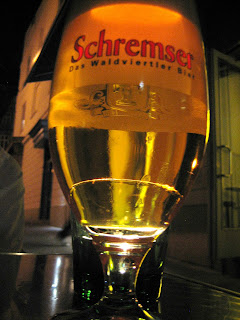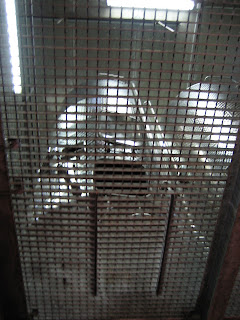After our visit to Weinrieder, whom we saw a few days earlier I realized that I left my note book there. So it necessitated a little detour from our planned direct route, Vienna to the Wachau.
 From Weinrider to the tiny wine village of Mailberg there was nothing but gentle fields. It was flat and for the most part, pretty dull. It kind of felt like Kansas with lots of windmills.
From Weinrider to the tiny wine village of Mailberg there was nothing but gentle fields. It was flat and for the most part, pretty dull. It kind of felt like Kansas with lots of windmills.
As we approached the tiny village of Mailberg the wheat started to give way to wine. Once there, we saw plenty of evidence of activity but no people. We passed through in the afternoon, perhaps they were all taking naps. It was a bummer we couldn't hang out. There were countless Heuriger, albeit closed, and some impressive vineyards. Really steep and stony, the hard to work type that only reward the determined.
We were really enjoying the drive when the GPS went black. Naturally, we forgot both the paper map and the car charger. Not the end of the world, but in the Austrian heartland, English is about as common as German in Kansas. We went into a cafe to try and charge the GPS with a wall charger (that ended up not working) and grab a bite. Boy did we feel like tourist. There was no avoiding the stares of the chain smoking patrons, we were clearly the most interesting thing in town. We ended up not even eating because they only took cash. We swallowed the last of our respectable local grunner (only 1 euro per glass. Less than the local beer!) and paid with the loose change in our pockets. Then, just to be safe, I shrugged my shoulders and said, "Kremstal?", to our server and got about the roughest directions possible. Magically, we actually ended up there. Or I should say, we ended up in an American style electronics store where we could buy a car charger and regain our bearings.
The road to the village of Oberfucha, on the south side of the Danube where Geyerhof is located made for great driving. From these curvy roads we could see vineyards, cutting deep lines in the hilly forest. Here the Gruner Veltliner and Riesling are planted to every exposure, unlike their sheer, typically linear neighbors in the Wachau where vineyards mainly parallel the river. Even though the 07 Rosenstieg Gruner and Sprinzenberg Riesling were the only wines from Geyerhof that I had previously tasted, this was still one of my most anticipated visits of the trip. Same for Kristyn, she loves their wines. Even when I pour her Geyerhof with out telling her what it is gives it a little..."oohh". Immediately upon arriving we sat down to a spectacular tasting right on the lawn in the courtyard of the estate. From here we got a 360 degree view of their cellar, winery and full family home in perfect aesthetic balance with the vineyards and hills that surround them. I thought, "These guys know what they are doing". The wines also fit the setting perfectly. They were a clear reflection of their environment that we were for a moment able to share. It is only when we go to the wine, instead of demanding that the wine come to us that we encounter these moments. Each one was unique but clearly connected to the others. Geyerhof wines are, in a nut shell: evocative. Deeply aromatic, complex, and taught, with minerality and ripe fruit. They are also energetic, with an almost electric intensity. From the bottom to the top, even in the unexpected scrumptious Zwiegelt, there is this quality that I can only describe as "energy". This is balanced by, an often, oily minerality and pearl-esque polish. Some are fuller, or sweeter or perhaps even gently coarse but they all share a certain signature. Proprietor Ilse Maier is this signature but more as shepherd and less as inventor. The wines are such exuberant expressions of place, they could teach terroir to Bud drinkers. After the tasting I wanted to have all of their wines back home to sell. It felt unfair to leave any of them out.
The Geyerhof estate was strikingly organized. The space was clearly designed for the processing of grapes but they have not let this destroy the space where they also live. To the visitor it all feels natural, maybe even archetypal. Seemingly, without effort or interruption of what was there before.
 This is Ilse's grandmothers cottage right next to the main house and cellar. They garden it together.
This is Ilse's grandmothers cottage right next to the main house and cellar. They garden it together.
You do not have to be a biologist to see that the vineyards are part of a healthy ecosystem. They are teaming with a life the vines are just part of. In some parts, it is hard to see where the vines stop and the forest starts, it is almost wild. Grapes have been grown in this area for over 1000 years by Benadictine Monks, who still work vineyards there today. In addition to farming their vines organically all fields adjacent to Geyerhof's are also farmed organically. This was been the case for over 20 years. I can only imagine what her neighbors thought when she stopped spraying her vines back when it would have looked like suicide.
 A happy slug crawling through the vineyards. Good thing they don't like grape vines, judging by their size they could do some damage.
A happy slug crawling through the vineyards. Good thing they don't like grape vines, judging by their size they could do some damage.

 An ancient hall.
An ancient hall.
Parting shot:
The last image I will leave you with is perhaps a little crass but what the hell? It amused me so it should amuse you. I was so struck by this clever creation I had to take a picture with my phone. Don't even think about importing these. They are our next get rich quick scheme.










 Greetings we have made contact here are some highlights from the last few days.
Greetings we have made contact here are some highlights from the last few days.








































